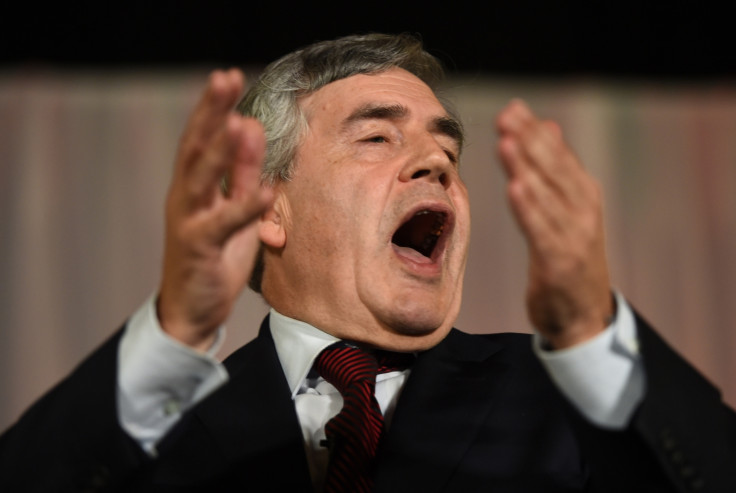William Keegan: Gordon Brown Saved Britain... and May Even Have Saved the World
Gordon Brown, Britain's chancellor of the exchequer from 1997 to 2007, and Prime Minister from 2007 to 2010, has surprised many observers by letting it be known that he will not be standing for re- election as a member of Parliament .

Mr Brown is certainly going out on a high. After a chequered premiership, he has tended to lie low , feeling bitter about his defeat in the election of 2010.
He has been widely credited for his prominent role in the G20 rescue operation for the world's economic and financial system in the face of the crisis of 2007-2008, and less wisely credited for delivering the British economy to the Conservative/ Liberal Democrat Coalition in much better shape than they ever acknowledged.
However, the reason why he can be said to be departing from mainstream politics on a high is that his last-minute intervention in the recent Scottish referendum campaign is almost universally considered to have 'saved the union' of England and Scotland. Such was the dramatic impact of his impassioned short speech on the eve of the referendum vote - I commend anyone who has not seen it to call it up on YouTube - that there was strong speculation that this might herald a revival of Brown's political career.
Instead, he appears to have elected to concentrate on his unpaid work for the United Nations, as Special Envoy for Global Education, and his job as chairman of the World Economic Forum's policy coordination group, best known for its annual meetings in Davos, Switzerland.
The fact that he was offered the latter post is well deserved recognition of his role in the formation of the G20 economic ' stimulus' package of April 2009, unveiled at the annual G20 meeting in London under his chairmanship. He had already played a major role in the bank rescue operations of 2008 , after which he spent months preparing for the April Summit. After its success in arresting a free fall in the world economy - world trade was collapsing at an annual rate of 20% in early 2009 - in a famous Freudian slip in the House of Commons , Brown claimed to have' saved the world' .
Your correspondent has known Gordon Brown well for many years, indeed, since not long after he first entered the House of Commons in 1983. I know how sore he felt about his election defeat. The fact of the matter is that the British economy was already making a remarkable recovery in the first half of 2010, but the Conservative/Liberal Democrat coalition stopped that recovery in its tracks with wildly exaggerated propaganda about the Budget deficit and 'Labour's Mess.'

Most of the deficit was the result of the impact of the banking crash on tax revenues, and on government spending, as unemployment rose. Brown's strategy was that both the UK and the rest of the European economy needed to grow out of the depression, and that it was vital not to cut back on the expansionary fiscal policy until recovery had been evident a lot longer than a few months.
Instead, the Coalition wildly exaggerated the scale of the ' problem' and introduced a policy of austerity which dampened those 'animal spirits' of businessmen. The UK then experienced three years of what shadow chancellor Ed Balls termed 'flatlining' , followed by the slowest economic recovery on record. What is more: this sorry state of affairs has meant that even the theoretical justification of it - the target of eliminating the deficit within the lifetime of the 2010-15 Parliament- will manifestly not be achieved.
The fact of the matter is that the British economy was already making a remarkable recovery in the first half of 2010, but the Conservative/Liberal Democrat coalition stopped that recovery in its tracks
Meanwhile a kind of economic civil war has now broken out within the Coalition, with Treasury Secretary Danny Alexander and Business Secretary Vince Cable openly attacking the Conservatives' plans for massive tax cuts should they win the coming election.
The case of Mr Alexander is particularly interesting. As chief secretary he is responsible for keeping public spending under control. He plainly thinks there is a limit to how many more cuts he can make, yet his chancellor wishes to plough on.
For his part, Gordon Brown recently said : "I dislike everything the Tories have done. ...I feel the cuts in social security benefits are heinous at a time when they are cutting tax for the very rich. I feel very angry that poverty is rising in this country."
Yes, there is indeed a lot for Labour to be angry about. Unfortunately, a civil war also seems to have broken out within the Labour Party, so that they are not taking political advantage of the internecine war within the Coalition and the failure of its Budget strategy.
William Keegan is a journalist and academic who is the senior economics commentator at The Observer.
© Copyright IBTimes 2025. All rights reserved.






















